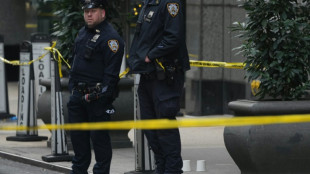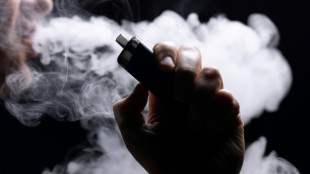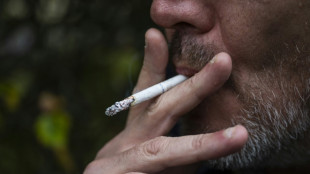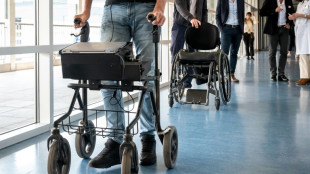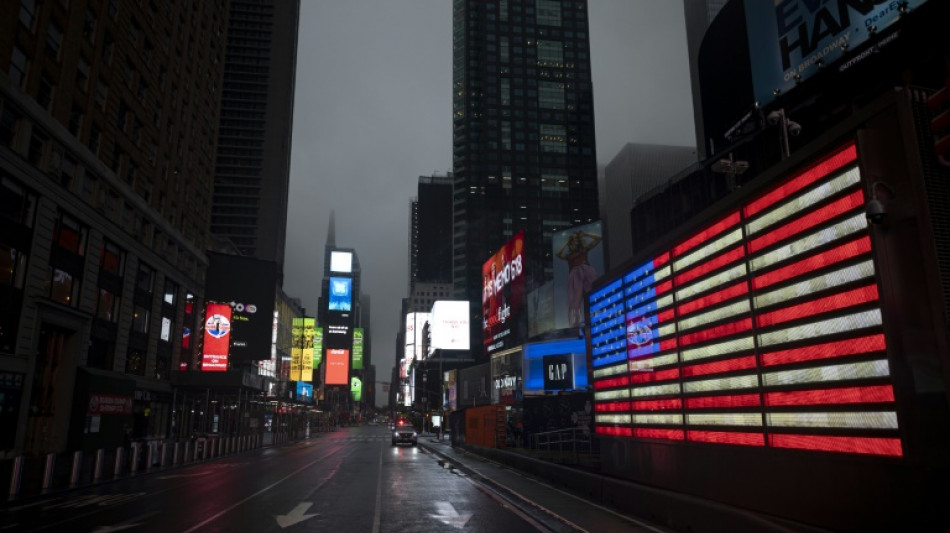
-
 South Korea president clings to power after martial law U-turn
South Korea president clings to power after martial law U-turn
-
Presidential vote seen as referendum on Romania's European future

-
 Hamilton bids farewell to Mercedes as Ferrari vie for title
Hamilton bids farewell to Mercedes as Ferrari vie for title
-
New Zealand unchanged in bid to hit back against England

-
 Macron seeks remedy to France's political crisis
Macron seeks remedy to France's political crisis
-
New Natalia Lafourcade album celebrates music's onstage evolutions

-
 Taiwan's Lai kicks off visit to US territory Guam
Taiwan's Lai kicks off visit to US territory Guam
-
Ivory Coast staple cassava meal gains UNESCO heritage status
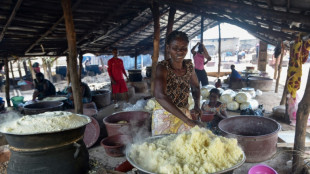
-
 OpenAI to partner with military defense tech company
OpenAI to partner with military defense tech company
-
Liverpool held but Slot salutes 'special' Salah

-
 Man City needed to break losing 'routine', says Guardiola
Man City needed to break losing 'routine', says Guardiola
-
Leipzig down Frankfurt to reach German Cup quarters, Cologne strike late

-
 Mbappe admits penalty miss 'big mistake' as Bilbao beat Real Madrid
Mbappe admits penalty miss 'big mistake' as Bilbao beat Real Madrid
-
'Sad, disappointed' Mbappe pays penalty as Bilbao beat Real Madrid

-
 US stocks surge to records, shrugging off upheaval in South Korea, France
US stocks surge to records, shrugging off upheaval in South Korea, France
-
Liverpool held in Newcastle thriller, Arsenal inflict Amorim's first defeat

-
 Shiffrin confirms she'll miss Beaver Creek World Cup races
Shiffrin confirms she'll miss Beaver Creek World Cup races
-
Corner kings Arsenal beat Man Utd to close gap on Liverpool

-
 Mbappe pays penalty as Bilbao beat Real Madrid
Mbappe pays penalty as Bilbao beat Real Madrid
-
NFL Jaguars place Lawrence on injured reserve with concussion

-
 North Korea, Russia defence treaty comes into force
North Korea, Russia defence treaty comes into force
-
Openda hits brace as Leipzig beat Frankfurt in German Cup last 16

-
 Schar punishes Kelleher blunder as Newcastle hold Liverpool in thriller
Schar punishes Kelleher blunder as Newcastle hold Liverpool in thriller
-
De Bruyne masterclass helps Man City end seven-game winless streak

-
 Syrian rebels surround Hama 'from three sides', monitor says
Syrian rebels surround Hama 'from three sides', monitor says
-
Lawyers seek leniency for France rape trial defendants, blaming 'wolf' husband

-
 OpenAI chief 'believes' Musk will not abuse government power
OpenAI chief 'believes' Musk will not abuse government power
-
Thousands rally in Georgia after police raid opposition offices

-
 S. Korea opposition push to impeach president
S. Korea opposition push to impeach president
-
Powell 'not concerned' US Fed would lose independence under Trump

-
 French government falls in historic no-confidence vote
French government falls in historic no-confidence vote
-
Syrian White Helmets chief 'dreams' of never pulling a body out of rubble again

-
 NBA Suns lose Durant for at least a week with ankle injury
NBA Suns lose Durant for at least a week with ankle injury
-
Warhammer maker Games Workshop enters London's top stocks index

-
 Iran Nobel winner released for three weeks, 'unconditional' freedom urged
Iran Nobel winner released for three weeks, 'unconditional' freedom urged
-
Red Cross marks record numbers of humanitarians killed in 2024

-
 Johnson's Grand Slam 'no threat', says World Athletics boss Coe
Johnson's Grand Slam 'no threat', says World Athletics boss Coe
-
Qatar's emir and UK's Starmer talk trade as state visit ends

-
 Cuba suffers third nationwide blackout in two months
Cuba suffers third nationwide blackout in two months
-
Russia, Ukraine to send top diplomats to OSCE summit in Malta

-
 Spanish royals to attend memorial service for flood victims
Spanish royals to attend memorial service for flood victims
-
LPGA, USGA new policy requires female at birth or pre-puberty change

-
 Stick to current climate change laws, US tells top UN court
Stick to current climate change laws, US tells top UN court
-
British Museum chief says Marbles deal with Greece 'some distance' away

-
 Pope Francis receives electric popemobile from Mercedes
Pope Francis receives electric popemobile from Mercedes
-
Gaza civil defence: thousands flee Israeli strikes, evacuation calls

-
 Trump names billionaire private astronaut as next NASA chief
Trump names billionaire private astronaut as next NASA chief
-
Pidcock to leave INEOS Grenadiers at end of season

-
 Seoul stocks weaken, Paris advances despite political turmoil
Seoul stocks weaken, Paris advances despite political turmoil
-
South America summit hopes to seal 'historic' trade deal with EU


US mourns one million dead from Covid-19
The United States has crossed the threshold of one million deaths from Covid-19, the White House said on Thursday, as the nation seeks to turn the page on the pandemic despite threats of another surge.
"Today, we mark a tragic milestone," President Joe Biden said in a statement that acknowledged the "unrelenting" pain of bereaved families, and urged Americans to remain vigilant as cases tick back up.
"One million empty chairs around the dinner table," Biden said. "Each an irreplaceable loss. Each leaving behind a family, a community, and a nation forever changed."
Biden's announcement came as he chaired a global virtual Covid summit, taking place as Europe also passed two million Covid deaths, focused on efforts to bring the pandemic under control worldwide and prepare for future health emergencies.
The US leader came to the summit hobbled by Congress' failure to approve $22.5 billion in continued emergency Covid funding, including for the international supply of vaccines, and he warned it was "critical" for lawmakers to keep financing testing, vaccines and treatments.
America recorded its first Covid-19 death, on the West Coast, in early February 2020. By the next month, the virus was ravaging New York and the White House was predicting up to 240,000 deaths nationwide.
But those projections were way off.
Even in New York -- the hard-hit early epicenter of America's Covid crisis -- the million death milestone was difficult to comprehend.
"It's unfathomable," Diana Berrent, one of the first people in New York state to catch Covid-19, said of the toll that far exceeds epidemiologists' worst predictions.
Back in spring 2020, New York City hospitals and morgues overflowed, and the sound of ambulance sirens rang down empty streets as then-president Donald Trump responded chaotically in Washington.
Two years on, and life in the Big Apple is largely back to normal as residents attempt to put the collective trauma of the virus that has killed 40,000 New Yorkers behind them.
Broadway stage lights are once again illuminated, yellow taxis clog main avenues and bars in business districts hum with post-work chatter.
"Without a doubt you feel the energy of the people that are on the streets. It's been a long time coming," Alfred Cerullo, president of a business improvement group in Midtown Manhattan, told AFP.
New York's rebound has been aided by its high inoculation numbers -- about 88 percent of adults are fully vaccinated, a rate that was boosted by mandates, including for indoor activities like dining.
Jeffrey Bank, owner of Carmine's restaurant near Times Square, says sales at the Italian eatery are better than they were in 2019, as residents and tourists make up for lost time.
"People have been sitting at home for two years. They want to celebrate and they're entitled to," he told AFP.
- 'Disconnect' -
But the city has a long way to go. Many stores remain empty and only 38 percent of Manhattan workers are in the office on an average weekday, according to Kastle Systems, a security firm that tracks building occupancy.
The Big Apple's tourism board also doesn't expect visitor numbers to get back to the 67 million of 2019 people for a few years, and business owners fear another wave of infections.
In recent weeks, the United States has seen an uptick in the number of daily virus cases, largely due to the new Omicron subvariant.
The rise has coincided with the lifting of mask mandates.
"I think we are in a place where psychologically and socially and economically, people are largely done with the pandemic," said Celine Gounder, an infectious disease expert at New York University.
"(But) the pandemic is not over. So you have a disconnect between what is happening epidemiologically and what's happening in terms of how people are responding," she told AFP.
Among the most at-risk are the unvaccinated, lower-income populations, uninsured people and communities of color, she says.
- Mandates -
Ideological clashes over curfews and mask and vaccine mandates characterized America's early pandemic response, as it racked up the world's highest death toll, with hospitals overwhelmed and morgues failing to keep up with the dead.
Trump was late to back social distancing, repeatedly undermined top scientist Anthony Fauci, peddled unproven medical treatments, and politicized mask-wearing -- before eventually being hospitalized with the virus himself.
Trump did pump billions of dollars into vaccine research and by mid-December 2020, the first vaccines were available for health care workers.
But deaths kept soaring amid a slow take-up of shots in conservative areas of the country.
New president Biden and many Democratic governors enforced mandates but Republican-led states like Florida and Texas outright banned them, highlighting America's patchwork of rules that made forming a unified response to the pandemic difficult.
pdh-ia-nr-bfm/ec
I.Meyer--BTB

